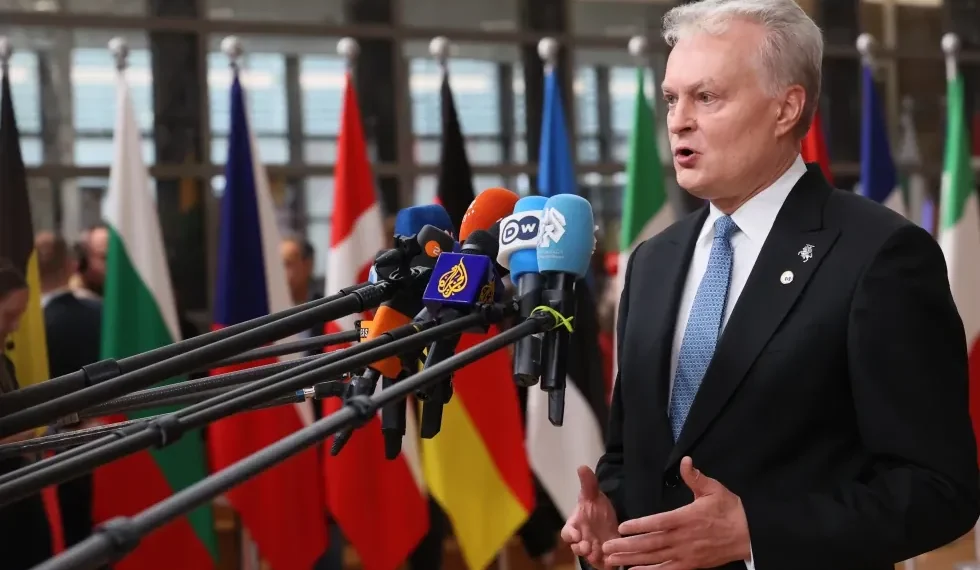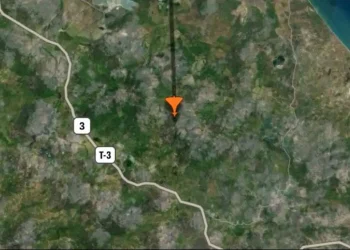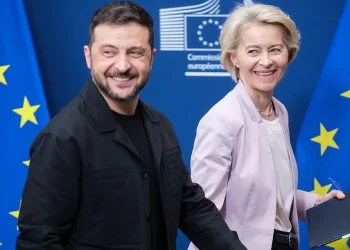Russian military aircraft briefly entered Lithuanian airspace on Thursday evening, prompting condemnation from Lithuanian President Gitanas Nausėda, who called the incident a violation of the country’s sovereignty and international law. The breach underscores growing regional tensions between Russia and NATO amid the ongoing war in Ukraine.
According to Lithuanian officials, two Russian planes crossed about 700 meters (roughly 765 yards) into Lithuanian territory before exiting after less than 20 seconds. The incident, which took place around 6 p.m. local time, involved a Sukhoi Su-30 fighter jet and an Ilyushin Il-78 refueling aircraft believed to be operating from Russia’s nearby Kaliningrad exclave.
Lithuania Protests “Blatant Breach” of Sovereignty
President Nausėda announced the violation in a post on X (formerly Twitter), describing it as “a blatant breach of international law and the territorial integrity of Lithuania.” He added that the episode highlights the urgent need to strengthen Europe’s collective air defense systems.
The Lithuanian Foreign Ministry said it would summon representatives from the Russian Embassy in Vilnius to formally protest the incursion. As of Friday morning, Moscow had not issued an official comment on the matter.
Lithuania, a NATO and European Union member state, has been among the most vocal critics of Russia’s invasion of Ukraine. The country shares borders with both Belarus—a close Russian ally—and Kaliningrad, a heavily militarized Russian territory positioned between Lithuania and Poland.
NATO Fighter Jets Scrambled
In response to the airspace violation, Lithuania’s armed forces said two Spanish Eurofighter Typhoons participating in NATO’s Baltic Air Policing mission were immediately scrambled. The jets flew toward the area to monitor the situation, though the Russian aircraft had already left Lithuanian airspace by the time they arrived.
The Lithuanian Defense Ministry suggested that the Russian planes may have been conducting aerial refueling exercises in Kaliningrad when they crossed the border inadvertently. However, officials emphasized that even brief or accidental incursions constitute violations of sovereignty under international aviation law.
Heightened Baltic Security Concerns
The airspace breach follows a series of recent incidents across the Baltic region involving Russian drones and military aircraft. Several of these have occurred near or across NATO borders, raising concerns that Moscow may be testing the alliance’s air defense readiness or reaction times.
Baltic states—Lithuania, Latvia, and Estonia—have repeatedly warned that Russia’s pattern of aggressive maneuvers, cyber activity, and disinformation campaigns represents elements of a hybrid warfare strategy aimed at destabilizing European security. Moscow has consistently denied probing NATO defenses or engaging in provocations.
Regional analysts say these incidents are likely to continue as NATO increases its surveillance operations and Moscow seeks to assert its presence near alliance borders.
European Defense Readiness in Focus
The timing of the airspace incident coincided with a major European Council summit in Brussels, where President Nausėda joined other EU leaders in endorsing “Readiness 2030”—a collective defense plan aimed at ensuring Europe can respond independently to external military threats by the end of the decade.
The plan includes proposals for enhanced air and missile defense coordination, increased defense spending, and improved military mobility across the continent. Lithuania has been one of the strongest advocates of closer European defense integration, arguing that deterrence must go hand-in-hand with rapid operational readiness.
In remarks following the summit, Nausėda said the latest airspace breach only strengthens the case for Europe to “take its defense into its own hands,” while maintaining its close coordination with NATO.
Background: Kaliningrad’s Strategic Role
Kaliningrad, Russia’s westernmost region, remains one of the most militarized areas in Europe. The enclave hosts advanced missile systems, air defense installations, and a significant Russian naval presence on the Baltic Sea. Its proximity to NATO territory has long made it a focal point of strategic tension.
Military experts note that aerial refueling and training missions from Kaliningrad often occur close to Lithuanian airspace, creating repeated opportunities for miscalculations or brief incursions. However, Lithuania and its NATO allies view such incidents as potential tests of the alliance’s response time and coordination.
Regional and International Reaction
Neighboring Baltic nations expressed solidarity with Lithuania. Estonia’s Foreign Ministry said it was “closely monitoring” the situation and reaffirmed the need for NATO vigilance along the alliance’s eastern flank. Poland also reiterated its commitment to joint air defense efforts through the NATO framework.
The European Union has not yet issued a collective statement but continues to support measures strengthening the bloc’s defense capabilities. NATO headquarters in Brussels confirmed it was aware of the Lithuanian report and said its air policing mission “remains on high readiness” to respond to any further incidents.
While Lithuania described the incursion as brief and limited, officials stressed that repeated airspace violations—intentional or otherwise—undermine regional stability and violate core principles of international law.
A Pattern of Provocations
This latest episode adds to a growing list of Russian military activities near NATO borders since the full-scale invasion of Ukraine began in 2022. Similar airspace breaches have been reported in Sweden, Finland, and Romania, prompting increased joint surveillance efforts and radar monitoring across Europe’s northern and eastern frontiers.
Security analysts say the incidents underscore both the fragility and importance of maintaining open military communication channels between NATO and Russia to prevent escalation. However, direct contacts have become limited as diplomatic ties between Moscow and Western capitals have deteriorated sharply since the start of the war.
Looking Ahead
For Lithuania and its Baltic neighbors, the latest airspace violation serves as another reminder of their exposed geographic position on NATO’s front line. As tensions remain high across Europe’s eastern borders, regional leaders are urging the alliance to continue rotating air and ground forces in the Baltics to maintain deterrence.
President Nausėda reiterated that Lithuania “will not tolerate any infringement” of its sovereignty and that European unity and defense preparedness remain vital to safeguarding peace in the region.
This article was rewritten by JournosNews.com based on verified reporting from trusted sources. The content has been independently reviewed, fact-checked, and edited for accuracy, neutrality, tone, and global readability in accordance with Google News and AdSense standards.
All opinions, quotes, or statements from contributors, experts, or sourced organizations do not necessarily reflect the views of JournosNews.com. JournosNews.com maintains full editorial independence from any external funders, sponsors, or organizations.
Stay informed with JournosNews.com — your trusted source for verified global reporting and in-depth analysis. Follow us on Google News, BlueSky, and X for real-time updates.














